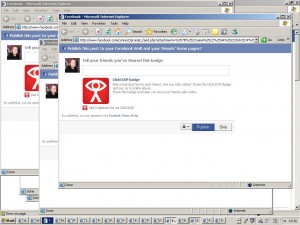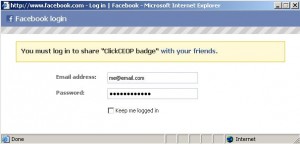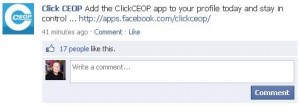Northern Constabulary is urging Facebook users across the Highlands and Islands to add a new application to make them safer online.
The Force today made the ‘app’ available on its official Facebook site www.facebook.com/northern.constabulary to help protect children and young people in the Highlands and Islands.
The UK’s national law enforcement agency dedicated to child protection – the Child Exploitation and Online Protection (CEOP) Centre) – and Facebook, the biggest social networking site, have joined forces to develop the initiative.
For the first time, it will give all Facebook users in the UK – and especially those aged between 13 – 18 years – direct access to CEOP’s advice and reporting centre ‘ClickCEOP’ giving them the very latest help on online safety as well as a dedicated facility for reporting instances of suspected grooming or inappropriate sexual behaviour.
The access will be provided via an ‘app’ that users can add or bookmark so it appears on their profile, as not only a constant source of help and reassurance for them but also as a strong visual signal to their friends, family and others that they are in control online.
The Force is also using the Twitter service to provide the public with a direct link between Northern Constabulary and the public. The service will be used to update members of the public with information on road closures, advice during major incidents, appeals for information and crime prevention advice to name but a few.
You can “follow” the Force’s tweets by visiting www.twitter.com/NorthernPolice and signing up to the Twitter service if you do not do so already.
The Facebook ‘app’ http://apps.facebook.com/clickceop will be backed by a new CEOP profile – ClickCEOP – that will look to engage with young people to help raise the profile of online safety. The move is also being supported by an advertising campaign on Facebook that will encourage take up. This will include an automatic advert appearing on every profile of users aged between 13-18 years inviting them to add the app.
A Force spokesperson said: “The internet is an amazing place where we can connect with each other and have fun, but we know that young users of social networking sites can be vulnerable.
“This announcement by CEOP represents a significant step forward in keeping young people safer on Facebook and we would urge all Facebook users in Highlands and Islands to add this application. If you are a parent on Facebook, add the app and encourage your children to do so too.
“This will act as a visible deterrent to offenders and your child will receive regular online safety tips from CEOP, so you can feel reassured that they are better protected online.”
As well as adding the ClickCEOP app, there are a number of ways in which young people can stay safe when using Facebook:
* Make sure privacy settings are set to private so the only people who can see your page and information are your friends
* Some people lie about who they are online so only add friends who you know in the real world
* Block or delete people who upset you or send nasty messages
* Tell a trusted adult if you have a concern about something that has happened to you online
Jim Gamble, Chief Executive of the Child Exploitation and Online Protection (CEOP) Centre said: “Today represents a huge step forward. By adding this app, Facebook users will have direct access to all the services that sit behind our ClickCEOP button and this should provide reassurance for the many parents whose teenage children use Facebook.
“We know from speaking to offenders that a visible deterrent could protect young people online. We urge all Facebook users not only to add the app, but also to bookmark it so that others can see that they’re in control online. Our dialogue with Facebook about adopting the ClickCEOP button is well documented ¿ this is a good day for child protection.”
Joanna Shields, Facebook’s Vice President for EMEA said: “Nothing is more important than the safety of our users, which is why we have invested so much in making Facebook one of the safest places on the internet.
“There is no single silver bullet to making the internet safer but by joining forces with CEOP, we have developed a comprehensive solution which marries our expertise in technology with CEOP’s expertise in online safety.
“Together we have developed a new way of helping young people stays safe online and backed this with an awareness campaign to publicise it to young users. It is only through the constant and concerted effort of the industry, police, parents and young people themselves that we can all keep safe online – whether on Facebook or elsewhere.”
CEOP’s new Facebook page will contain polls, news alerts and status updates. The page will look at topics that teenagers care about, such as celebrities, music and exams and will link these subjects to questions about online safety. The CEOP page will also give users the option to add the new ClickCEOP application.




